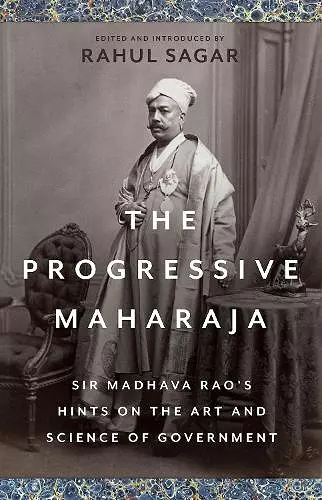The Progressive Maharaja
Sir Madhava Rao's Hints on the Art and Science of Government
Format:Hardback
Publisher:C Hurst & Co Publishers Ltd
Published:19th May '22
Should be back in stock very soon

Hints on the Art and Science of Government was the first treatise on statecraft produced in modern India. It consists of lectures that Raja Sir T. Madhava Rao delivered in 1881 to Sayaji Rao Gaekwad III, the young Maharaja of Baroda. Universally considered the foremost Indian statesman of the nineteenth century, Madhava Rao had served as dewan (or prime minister) in the native states of Travancore, Indore and Baroda. Under his command, Travancore and Baroda came to be seen as 'model states', whose progress demonstrated that Indians were capable of governing well. Rao's lectures summarise the fundamental principles underlying his unprecedented success. He explains how and why a Maharaja ought to marry the classical Indian ideal of raj dharma, which enjoins rulers to govern dutifully, with the modern English ideal of limited sovereignty. This makes Hints an exceptionally important text: it shows how, outside the confines of British India, Indians consciously and creatively sought to revise and adapt ideals in the interests of progress. This landmark edition contains both the newly rediscovered, original lecture manuscripts; and an authoritative introduction, outlining Rao's remarkable career, his complicated relationship with Sayaji Rao III, and the reasons why his lectures have been neglected-until now.
'The Progressive Maharaja introduces us to Raja Sir Madhava Rao’s fascinating manifesto on statecraft, Hints on the Art and Science of Government. In rich detail, drawing on his extensive investigation of historical sources, Sagar delves into the story behind the man and the thoughtful text he produced, bringing us a fine, original and unjustly overlooked contribution to Indian political thought.' -- Shashi Tharoor, Indian MP and author of Inglorious Empire: What the British Did to India
'This book illustrates what historians do--masterful research identifying significant aspects of the past. Sagar's admirable talents recount the life of India's most successful political operator of the nineteenth century and reproduce his handbook on how to be a ruler. Machiavelli meets the British Empire!' -- Robin Jeffrey, Professor, Institute of South Asian Studies, National University of Singapore
'A unique Indian contribution to the genre of Art of Government treatises, that skilfully fuses liberal constitutionalism with raj dharma. Sagar's excellent introduction provides the context for this ambitious pedagogical experiment in producing an enlightened monarch proficient in statecraft.' -- Niraja Gopal Jayal, Avantha Chair, India Institute, King's College London
'Sagar intervenes brilliantly in debates on good governance by bringing to light a hitherto unknown, but still immensely relevant, nineteenth-century treatise on statecraft. This beautifully written book would appeal to all those interested in the richness and plurality of Indian political thought.' -- Nandini Gooptu, Associate Professor of South Asian Studies, University of Oxford
'Illuminating the interface between princely India and British officialdom, this is a valuable contribution to knowledge about princely states in late nineteenth and early twentieth-century India.' -- T.C.A. Raghavan, former Indian High Commissioner to Pakistan, and author of History Men: Jadunath Sarkar, G.S. Sardesai, Raghubir Sinh and Their Quest for India's Past
'This hitherto neglected but important nineteenth-century Indian political treatise on what makes a good ruler will fascinate anyone interested in Indian colonial history and political theory. Scrupulously researched, this is a clear, concise summary of the history of the princely states and their relationship with the British Raj.' -- John Zubryzcki, author of The House of Jaipur
ISBN: 9781787385412
Dimensions: unknown
Weight: unknown
360 pages